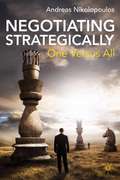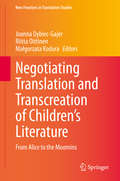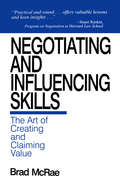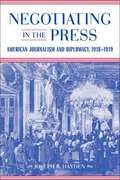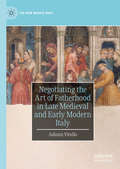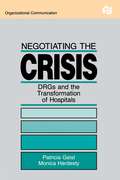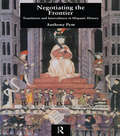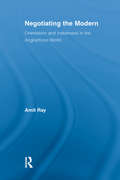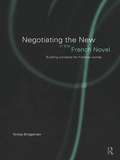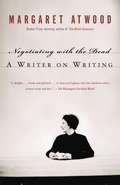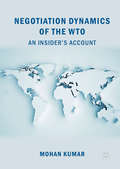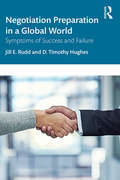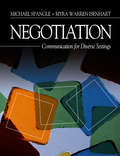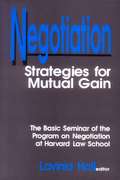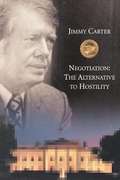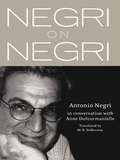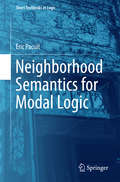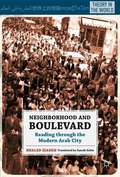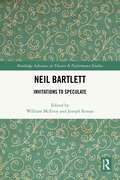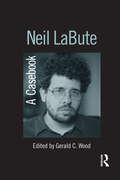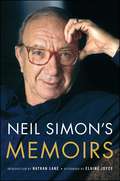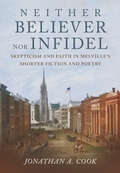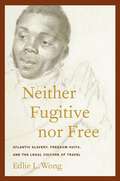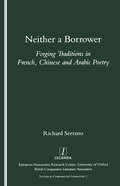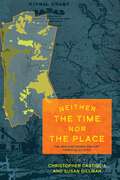- Table View
- List View
Negotiating Strategically
by Andreas NikolopoulosNegotiation is a key part of daily lives, but learning how to negotiate successfully is a valuable skill. The author provides a tool kit for negotiation, demonstrating new methods and giving practical advice.
Negotiating Translation and Transcreation of Children's Literature: From Alice to the Moomins (New Frontiers in Translation Studies)
by Riitta Oittinen Joanna Dybiec-Gajer Małgorzata KoduraThis book offers fresh critical insights to the field of children’s literature translation studies by applying the concept of transcreation, established in the creative industries of the globalized world, to bring to the fore the transformative, transgressional and creative aspects of rewriting for children and young audiences. This socially situated and culturally dependent practice involves ongoing complex negotiations between creativity and normativity, balancing text-related problems and genre conventions with readers’ expectations, constraints imposed by established, canonical translations and publishers’ demands. Focussing on the translator’s strategies and decision-making process, the book investigates phenomena where transcreation is especially at play in children’s literature, such as dual address, ambiguity, nonsense, humour, play on words and other creative language use; these also involve genre-specific requirements, for example, rhyme and rhythm in poetry. The book draws on a wide range of mostly Anglophone texts for children and their translations into languages of limited diffusion to demonstrate the numerous ways in which information, meaning and emotions are transferred to new linguistic and cultural contexts. While focussing mostly on interlingual transfer, the volume analyses a variety of translation types from established, canonical renditions by celebrity translators to non-professional translations and intralingual rewritings. It also examines iconotextual dynamics of text and image. The book employs a number of innovative methodologies, from cognitive linguistics and ethnolinguistics to semiotics and autoethnographic approaches, going beyond text analysis to include empirical research on children’s reactions to translation strategies. Highlighting the complex dynamics at work in the process of transcreating for children, this volume is essential reading for students and researchers in translation studies, children’s fiction and adaptation studies.
Negotiating and Influencing Skills: The Art of Creating and Claiming Value
by Brad McRaeNegotiating and Influencing Skills provides the tools needed to negotiate effectively in order to obtain the best result--whether you are working on securing a contract, obtaining consensus on a goal, building commitment among your employees or classmates, coaching for employee development, or dealing with family and friends. Based on the theoretical approach to cooperative negotiating skills developed at the Harvard Project on Negotiation, the book presents a two-step process toward mastery of negotiating and influencing skills that includes the development of skills by means of interactive exercises and application of these negotiating skills in personal and professional life. Evaluation tools and many exercises are used to help the reader develop and broaden his or her negotiation style and become more flexible and fluid in approach. Difficult people and difficult situations provide us with one of the best sources of information on what we need to do differently in order to negotiate more effectively. The book examines the eight critical skills we all need to negotiate successfully with difficult people or difficult situations. Learning effective negotiating and influencing skills is a lifelong process. Reading this book is only the beginning point in that process. Suggestions are presented regarding books to read, courses to take, and the continuing use of the feedback forms provided in this book. Anyone who negotiates on a regular basis and is desirous of improving his or her negotiating and influencing skills, whether that be in the work setting or in their personal lives, will appreciate the approaches offered in this book, particularly professors and students of management, marketing, organizational communication, political science, public policy, psychology, industrial organization psychology, social work, negotiation, family studies, and law.
Negotiating in the Press: American Journalism and Diplomacy, 1918-1919 (Media & Public Affairs)
by Joseph R. HaydenNegotiating in the Press offers a new interpretation of an otherwise dark moment in American journalism. Rather than emphasize the familiar story of lost journalistic freedom during World War I, Joseph R. Hayden describes the press's newfound power in the war's aftermath -- that seminal moment when journalists discovered their ability to help broker peace talks. He examines the role of the American press at the Paris Peace Conference of 1919, looking at journalists' influence on the peace process and their relationship to heads of state and other delegation members. Challenging prevailing historical accounts that assume the press was peripheral to the quest for peace, Hayden demonstrates that journalists instead played an integral part in the talks, by serving as "public ambassadors." During the late 1910s, as World War I finally came to a close, American journalists and diplomats found themselves working in unlikely proximity, with correspondents occasionally performing diplomatic duties and diplomats sometimes courting publicity. The efforts of both groups to facilitate the peace talks at Versailles arose amidst the vision of a "new diplomacy," one characterized by openness, information sharing, and public accountability. Using evidence from memoirs, official records, and contemporary periodicals, Hayden reveals that participants in the Paris Peace Conference continually wrestled with ideas about the roles of the press and, through the press, the people. American journalists reported on an abundance of information in Paris, and negotiators could not resist the useful leverage that publicity provided. Peacemaking via publicity, a now-obscure dimension of progressive statecraft, provided a powerful ideological ethos. It hinted at dynamically altered roles for journalists and diplomats, offered hope for a world desperate for optimism and order, and, finally, suggested that the fruits of America's great age of reform might be shared with a Europe exhausted by war. The peace conference of 1919, Hayden demonstrates, marked a decisive stage in the history of American journalism, a coming of age for many news organizations. By detailing what journalists did before, during, and after the Paris talks, he tells us a great deal about how the negotiators and the Wilson administration worked throughout 1919. Ultimately, he provides a richer integrative view of peacemaking as a whole. An engaging analysis of diplomacy and the Fourth Estate, Negotiating in the Press offers a fascinating look at how leading nations democratized foreign policy a century ago and ushered in the dawn of public diplomacy.
Negotiating the Art of Fatherhood in Late Medieval and Early Modern Italy (The New Middle Ages)
by Juliann VitulloNegotiating the Art of Fatherhood in Late Medieval and Early Modern Italy examines contested notions of fatherhood in written and visual texts during the development of the mercantile economy in fourteenth- and fifteenth-century Italy. It analyzes debates about the household and community management of wealth, emotion, and trade in luxury “goods,” including enslaved women, as moral questions. Juliann Vitullo considers how this mercantile economy affected paternity and the portraits of ideal fatherhood, which in some cases reconceived the role of fathers and in others reconfirmed traditional notions of paternal authority.
Negotiating the Crisis: Drgs and the Transformation of Hospitals (Routledge Communication Series)
by Patricia Geist Monica HardestyIn 1984 Congress revamped Medicare to save a financially distraught health care system, thus transforming the hospital as an organization. Diagnosis Related Groups (DRGs) -- the cornerstone of this extensive reorganization -- have triggered repercussions that are still adversely affecting health care professionals. This volume cuts to the heart of this crisis, examining the difficulties and foibles of going from DRG Legislation to DRG practices and giving voice to the professionals who must carve out a new reality under DRGs. It exposes the disputes between the various professional groups -- administrators, physicians, and nurses --over the implementation of DRGS, and how these professionals maneuver to manage the health service problems created by the policy. The book's authors provide an insightful analysis of the way policy innovations can wreak havoc on an organization and how professionals working together eventually negotiate order out of the chaos of change. The volume's narrative style of research is one feature that makes the presentation of the authors' findings unique from other works on Medicare legislation. Additionally, the book offers a case study approach to communication and sociological matters of a significant health care issue.
Negotiating the Frontier: Translators and Intercultures in Hispanic History
by Anthony PymWhy would a Latin Qur'an be addressed to readers who knew no Latin? What happens when translators work on paper rather than parchment? Why would a Jewish rabbi translate a bible for Christians? How can a theorist successfully criticize a version of Aristotle without knowing any Greek? Why were children used to bring down an Amerindian civilization? Why does the statue of Columbus in Barcelona point straight to Israel? Why should a Nicaraguan poet cite a French poem in order to explain a volcano in Nicaragua? This book does more than answer such questions. It uses them to discuss some of the most fundamental and complex issues in contemporary Translation Studies and Cultural Studies. Identifying cultural intermediaries as members of medieval frontier society, it traces the stages by which that society has assisted in the creation of Hispanic cultures. Individual case studies go from the twelfth-century Christian, Islamic and Jewish exchanges right through to the not unrelated complexity of today's translation schools in Spain, mining a history rich in anecdote and paradox. Further aspects trace key concepts such as disputation, the medieval hierarchy of languages, the nationalist mistrust of intermediaries, the effects of decolonization on development ideology, and the difficulties of training students for globalizing markets.
Negotiating the Modern: Orientalism and Indianness in the Anglophone World (Literary Criticism and Cultural Theory)
by Amit RayThis book explicates long-standing literary celebrations of 'India' and 'Indian-ness' by charting a cultural history of Indianness in the Anglophone world, locating moments (in intellectual, religious and cultural history) where India and Indianness are offered up as solutions to modern moral, ethical and political questions in the 'West.' Beginning in the early 1800s, South Asians actively seek to occupy and modify spaces created by the scholarly discourses of Orientalism: the study of the East (‘Orient’) via Western (‘European’) epistemological frameworks. Tracing the varying fortunes of Orientalist scholars from the inception of British rule, this study charts the work of key Indologists in the colonial era. The rhetorical constructions of East and West deployed by both colonizer and colonized, as well as attempts to synthesize or transcend such constructions, became crucial to conceptions of the ‘modern.’ Eventually, Indian desire for political sovereignty together with the deeply racialized formations of imperialism produced a shift in the dialogic relationship between South Asia and Europe that had been initiated and sustained by orientalists. This impetus pushed scholarly discourse about India in Europe, North America and elsewhere, out of what had been a direct role in politics and theology and into high ‘Literary’ culture.
Negotiating the New in the French Novel: Building Contexts for Fictional Worlds
by Teresa BridgemanIn Negotiating the New in the French Novel Teresa Bridgeman applies insights from pragmatic theory to the French novel in order to examine its discourse conventions. Focussing on texts by some of the greatest and most innovative French novelists - Diderot, Balzac, Flaubert, Zola, Celine, Sarraute and Perec - Bridgeman analyses how these authors established their own conventions, challenged reader expectations and drew conventions from other literary and non-literary forms. Negotiating the New in the French Novel shows the development of changing perceptions of genre, author and reader. This book will make fascinating reading for students of French literature - particularly of the nineteenth century novel, students of Stylistics and of Narratology.
Negotiating with the Dead: A Writer on Writing
by Margaret AtwoodIn this wise and irresistibly quotable book, one of the most intelligent writers now working in English addresses the riddle of her art: why people pursue it, how they view their calling, and what bargains they make with their audiences, both real and imagined. To these fascinating issues Margaret Atwood brings a candid appraisal of her own experience as well as a breadth of reading that encompasses everything from Dante to Elmore Leonard. An ambitious artistic inquiry conducted with unpretentious charm, Negotiating with the Dead is an invaluable insider’s view of the writer’s universe.
Negotiation Dynamics of the WTO: An Insider's Account
by Mohan KumarThe book aims at informing and educating the public at large about the intricacies of the Negotiation Dynamics at the WTO. It traces the period from the launch of the Uruguay Round in 1986 to its conclusion at Marrakesh in 1994 and the subsequent entry into force of the WTO on 1 January 1995.The book shows how WTO Ministerial Conference in Seattle was doomed to fail and its failure led to “trust deficit” between the developed countries on the one hand and certain key developing and least-developed countries on the other. Thus tracing the WTO saga that began in the wake of the failure at Seattle and the difficult path that led to the launch of a new Round at Doha in November 2001.The book throws light on India’s domestic decision-making structure as well as some of the factors driving India’s negotiating stance at the WTO. It also describes the current impasse at the WTO and offers some ideas to revive an institution that is so crucial for the smooth functioning of the multilateral trading system.
Negotiation Preparation in a Global World: Symptoms of Success and Failure
by Jill E. Rudd D. Timothy HughesNegotiation Preparation in a Global World guides the reader through a series of issues to consider in building international and intercultural business negotiation skills. It takes the approach of examining failed business negotiations to analyze how improved communication might have led to successful outcomes. Each chapter presents theoretical background related to a communication failure and explores alternative strategies to the situation. This volume is ideal for undergraduate- and graduate-level students studying business, leadership, and organizational development, as well as those new to the global marketplace or interested in learning how to negotiate in the intercultural business arena.
Negotiation: Communication for Diverse Settings
by Dr Michael L. Spangle Dr Myra Warren IsenhartNegotiation is not formulaic. How we negotiate is determined largely by the context in which the negotiation process takes place. Negotiation: Communication for Diverse Settings provides the reader with a comprehensive overview of the negotiation process as it applies to a wide variety of contexts. Skillfully weaving practitioner interviews and real world examples throughout the book, Michael Spangle and Myra Warren Isenhart emphasize the day-to-day relevance of negotiation skill. The authors provide knowledge vital to successful negotiation in a variety of situations, including interpersonal relations, the workplace, shopping and other consumer settings, community relations, and international affairs. Discussions of the moral and ethical dilemmas of negotiation-as well as the detail provided in various sections, such as international negotiations will undoubtedly prove useful to novice and seasoned negotiators alike.
Negotiation: Strategies for Mutual Gain
by Dr Lavinia HallWith contributions from top scholars in the field of negotiation, this clear and entertaining volume effectively blends technique with theory to present frameworks for effective negotiating, analyses of person-to-person negotiating situations and applications in organizational settings. Building on the concept that conflict, when managed well, can provide the impetus for growth, constructive change and mutual benefit, the book is dedicated to breaking the paradigm of winning and losing and transforming negotiation into a search for improved solutions to problems.
Negotiation: The Alternative to Hostility
by Jimmy CarterThis first address of the Carl Vinson Memorial Lecture Series at Mercer University is a masterful assessment of the difficulties of resolving disputes. President Carter's guidelines for establishing a more stable peace in the world are concise and imaginative without sacrificing their essential practicality.
Negri on Negri: in conversation with Anne Dufourmentelle
by Antonio NegriFirst published in 2004. Routledge is an imprint of Taylor & Francis, an informa company.
Neighborhood Semantics for Modal Logic
by Eric PacuitThis book offers a state-of-the-art introduction to the basic techniques and results of neighborhood semantics for modal logic. In addition to presenting the relevant technical background, it highlights both the pitfalls and potential uses of neighborhood models - an interesting class of mathematical structures that were originally introduced to provide a semantics for weak systems of modal logic (the so-called non-normal modal logics). In addition, the book discusses a broad range of topics, including standard modal logic results (i. e. , completeness, decidability and definability); bisimulations for neighborhood models and other model-theoretic constructions; comparisons with other semantics for modal logic (e. g. , relational models, topological models, plausibility models); neighborhood semantics for first-order modal logic, applications in game theory (coalitional logic and game logic); applications in epistemic logic (logics of evidence and belief); and non-normal modal logics with dynamic modalities. The book can be used as the primary text for seminars on philosophical logic focused on non-normal modal logics; as a supplemental text for courses on modal logic, logic in AI, or philosophical logic (either at the undergraduate or graduate level); or as the primary source for researchers interested in learning about the uses of neighborhood semantics in philosophical logic and game theory.
Neighborhood and Boulevard
by Khaled ZiadehCombines the styles of memoir, history, anthropology, and theory to develop an innovative reflection on the materiality of culture. Through its style and content, the text challenges the Orientalist bifurcation between tradition and modernity in the Arab world, revealing instead tradition's own dynamism and its coexistence alongside modernity.
Neil Bartlett: Invitations to Speculate (Routledge Advances in Theatre & Performance Studies)
by William McEvoy Joseph RonanThis book explores Neil Bartlett’s groundbreaking contributions to queer cultural production in the United Kingdom. It adopts a range of critical perspectives, presenting original scholarship on Bartlett’s fiction, theatre, performance, site-specific work, and adaptations, as well as more personal reflections on Bartlett’s influence and legacy.Charting his emergence as a radical queer artist in the 1970s, his writing for performance and theatre in the 1980s to the present day, and his evocative novels about queer spaces and hidden histories, the book considers Bartlett’s works as ‘invitations to speculate’: to view and imagine otherwise, as part of a political aesthetics committed to making queer lives visible. Bartlett’s bold, sensuous, and challenging work crosses genres to find new ways of articulating queer desires, unearthing histories of the body, pleasure, and gay subjectivity while connecting queer experiences across time.Dealing with topics including memory and loss, AIDS and its legacy, marginality, community, and identity, the collection shows how Bartlett embraces the past as a way of reimagining queer futures and demonstrates his status as one of the UK’s leading queer artists.
Neil LaBute: A Casebook (Casebooks on Modern Dramatists)
by Gerald C. WoodNeil LaBute: A Casebook is the first book to examine one of the most successful and controversial contemporary American playwrights and filmmakers. While he is most famous, and in some cases infamous, for his early films In the Company of Men and Your Friends and Neighbors, Labute is equally accomplished as a playwright. His work extends from the critique of false religiosity in Bash to examinations of opportunism, irresponsible art, failed parenting, and racism in later plays like Mercy Seat, The Shape of Things, The Distance From Here, Fat Pig, Autobahn, and the very recent This Is How It Goes and Some Girls. Like David Mamet, an acknowledged influence on him, and Conor McPhereson, with whom he shares some stylistic and thematic concerns, LaBute tends to polarize audiences. The angry voices, violent situations, and irresponsible behavior in his works, especially those focusing on male characters, have alienated some viewers. But the writer's religious affiliation and refusal to condone the actions of his characters suggest he is neither exploitive nor pornographic. This casebook explores the primary issues of the writer's style, themes, and dramatic achievements. Contributors describe, for example, the influences (both classical and contemporary) on his work, his distinctive vision in theater and film, the role of religious belief in his work, and his satire. In addition to the critical introduction by Wood and the original essays by leading dramatic and literary scholars, the volume also includes a bibliography and a chronology of the playwright's life and works.
Neil Simon's Memoirs
by Neil SimonThe complete memoirs of playwright Neil Simon--the author of such iconic works as Lost in Yonkers, The Odd Couple, Biloxi Blues, and The Goodbye Girl--now with a new introduction and afterword.This omnibus edition combines Neil Simon's two memoirs, Rewrites and The Play Goes On, into one volume that spans his extraordinary five-decade career in theater, television, and film. Rewrites takes Simon through his first love, his first play, and his first brush with failure. There is the humor of growing up in Washington Heights (the inspiration for his play Brighton Beach Memoirs) where, despite his parents' rocky marriage and many separations, he learned to see the funny side of family drama, as when his mother screamed thinking she saw a body on the floor in their apartment--it turned out to be the clothes his father discarded in the hallway after a night of carousing. He describes his marriage to his beloved wife Joan, and writes lucidly about the pain of losing her to cancer. The Play Goes On adds to his life's story, as he wins the Pulitzer Prize and reflects with humor and insight on his tumultuous life and meteoric career. Now, with the whole story in one place, Neil Simon's collected memoirs trace the history of modern entertainment over the last fifty years through the eyes of a man who started life the son of a garment salesman and became the greatest--and most successful--American playwright of all time.
Neither Believer nor Infidel: Skepticism and Faith in Melville's Shorter Fiction and Poetry
by Jonathan A. CookShedding new light on both classic and lesser-known works in the Melville canon with particular attention to the author's literary use of the Bible, Neither Believer Nor Infidel examines the debate between religious skepticism and Christian faith that infused Herman Melville's writings following Moby-Dick. Jonathan A. Cook's study is the first to focus on the decisive role of faith and doubt in Melville's writings following his mid-career turn to shorter fiction, and still later to poetry, as a result of the commercial failures of Moby-Dick and Pierre. Nathaniel Hawthorne claimed that Melville "can neither believe nor be comfortable in his unbelief," a remark that encapsulates an essential truth about Melville's attitude to Christianity. Like many of his Victorian contemporaries, Melville spent his literary career poised between an intellectual rejection of Christian dogma and an emotional attachment to the consolations of non-dogmatic Christian faith. Accompanying this ambivalence was a lifelong devotion to the text of the King James Bible as both moral sourcebook and literary template. Following a biographical overview of skeptical influences and manifestations in Melville's early life and career, Cook examines the evidence of religious doubt and belief in "Bartleby, the Scrivener," "Cock-a-Doodle-Doo!," "The Encantadas," Israel Potter, Battle-Pieces, Timoleon, and Billy Budd. Accessible for both the general reader and the scholar, Neither Believer Nor Infidel clarifies the ambiguities of Melville's pervasive use of religion in his fiction and poetry. In analyzing Melville's persistent oscillation between metaphysical rebellion and attenuated belief, Cook elucidates both well-known and under-appreciated works.
Neither Fugitive nor Free: Atlantic Slavery, Freedom Suits, and the Legal Culture of Travel (America and the Long 19th Century #8)
by Edlie L. WongPart of the American Literatures Initiative Series Neither Fugitive nor Free draws on the freedom suit as recorded in the press and court documents to offer a critically and historically engaged understanding of the freedom celebrated in the literary and cultural histories of transatlantic abolitionism. Freedom suits involved those enslaved valets, nurses, and maids who accompanied slaveholders onto free soil. Once brought into a free jurisdiction, these attendants became informally free, even if they were taken back to a slave jurisdiction—at least according to abolitionists and the enslaved themselves. In order to secure their freedom formally, slave attendants or others on their behalf had to bring suit in a court of law.Edlie Wong critically recuperates these cases in an effort to reexamine and redefine the legal construction of freedom, will, and consent. This study places such historically central anti-slavery figures as Frederick Douglass, Olaudah Equiano, and William Lloyd Garrison alongside such lesser-known slave plaintiffs as Lucy Ann Delaney, Grace, Catharine Linda, Med, and Harriet Robinson Scott. Situated at the confluence of literary criticism, feminism, and legal history, Neither Fugitive nor Free presents the freedom suit as a "new" genre to African American and American literary studies.
Neither a Borrower: Forging Traditions in French, Chinese and Arabic Poetry
by Richard A. Serrano"In his studies of borrowing from distant poetic traditions, Serrano aims to uncover the heterogenity of influences and intentions in the most canonical of texts: ""Mallarme"" (1842-98), ""Segalen"" (1878-1919), ""Wang Wei"" (701-61), the ""Classic of Poetry"" (8th century BCE), ""Buhturi"" (821-97), and the ""Qur'an"" (7th century CE). Arguing, among other things that Mallarme was really a Chinese poet, that ancient Chinese poets discovered the workings of film imagery, and that the Qur'an's apparently disjointed narrative is profoundly lyrical, Serrano intends to overturn accepted notions of how to read individual works. He brings methodologies from the study of one literature to bear on the reading of another."
Neither the Time nor the Place: The New Nineteenth-Century American Studies
by Susan Gillman Christopher CastigliaThe usefulness of time and place as defining categories would seem to be baked into the very notion of nineteenth-century American literary studies, yet they have challenged scholars practically since the field's inception. In Neither the Time nor the Place seventeen critics consider how the space-time dyad has both troubled and invigorated Americanist scholarship in recent decades and make explicit how time and place are best considered in tandem, interrogating each other.Taken together, the essays challenge depictions of place and time as bounded and linear, fixed and teleological, or mere ideological constructions. They address both familiar and unexpected objects, practices, and texts, including a born-digital Melville, documents from the construction of the Panama Canal, the hollow earth, the desiring body, textual editing, marble statuary, the sound of frogs, spirit photography, and twentieth-century Civil War fiction. The essays draw on an equally wide variety of critical methodologies, integrating affect studies, queer theory, book history, information studies, sound studies, environmental humanities, new media studies, and genre theory to explore the unexpected dimensions that emerge when time and place are taken as a unit. The pieces are organized around considerations of citizenship, environment, historiography, media, and bodies—five political, cultural, and/or methodological foci for some of the most provocative new work being done in American literary studies.Neither the Time nor the Place is a book not only for scholars and students already well grounded in the study of nineteenth-century American literature and culture, but for anyone, scholar or student, looking for a roadmap to some of the most vibrant work in the field.Contributors: Wai Chee Dimock, Stephanie Foote, Matthew Pratt Guterl, Coleman Hutchison, Rodrigo Lazo, Caroline Levander, Robert S. Levine, Christopher Looby, Dana Luciano, Timothy Marr, Dana D. Nelson, Ifeoma C. Kiddoe Nwankwo, Mark Storey, Matthew E. Suazo, and Edward Sugden.
